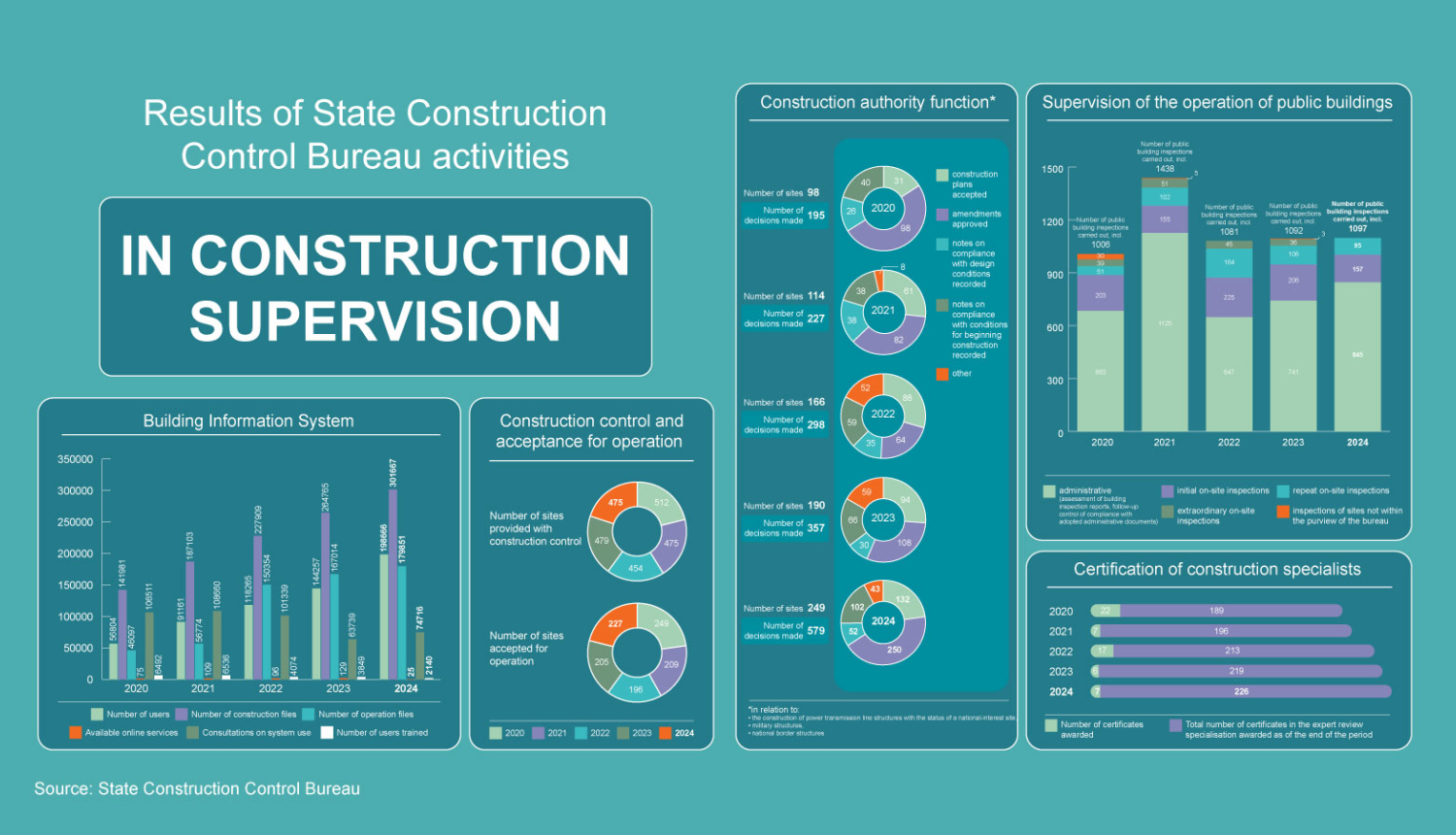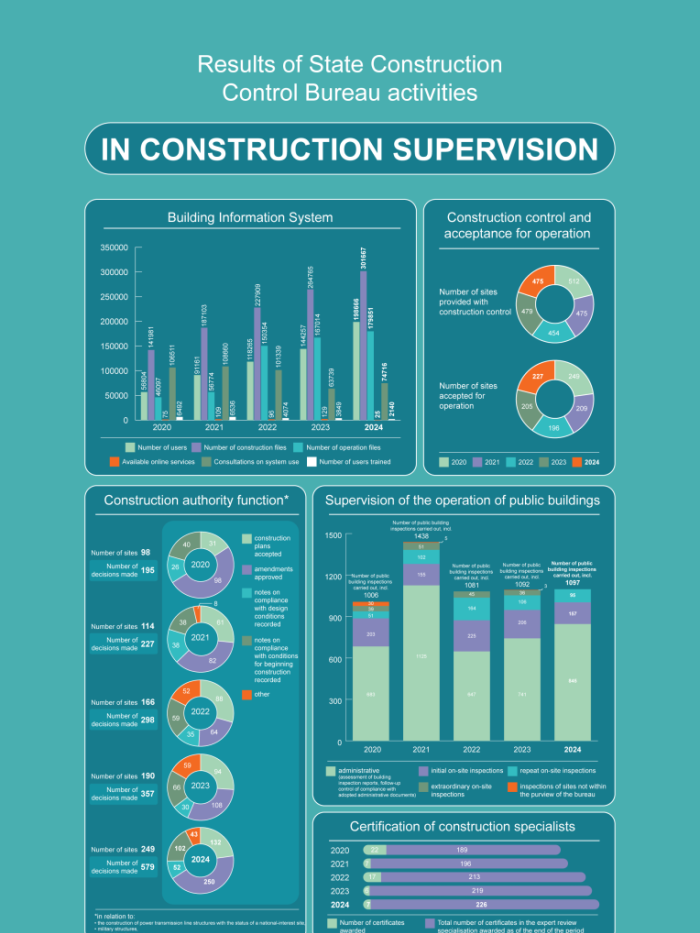2024 brought rapid growth for the Building Information System (BIS) developed by the State Construction Control Bureau (SCCB), creating new solutions for exchanging data as well as features for apartment owners they previously did not have.
In August last year, a data exchange and sharing solution was implemented in conjunction with the National Cultural Heritage Board, making it possible to retrieve data about sites registered in BIS as cultural heritage sites, cultural monument site grounds, or their respective protection zones, which enables the effective use of the data in construction supervision processes. An interface for exchanging data with SIA ‘Latvijas standarts’ (LVS) was also developed, thanks to which construction specialists can log in to the LVS reading room and consult standards through BIS.
Focus on convenience and automation
Owners of apartments in apartment buildings got new features for managing their property. Although it has been possible to create a digital house file in BIS since 2023, a significant increase in the use of this function was observed specifically in 2024. Building managers actively started adding documents to house files, with 248,656 documents registered as of the end of November 2024. During that period, BIS functions were expanded with new tools: for example, the development and implementation of minority voting. In order to spur the interest of the public in managing their real estate, the house file and voting features were also added to BIS Mobile.
BIS also saw improvements aimed at more automation and speed. These resulted in the introduction of mobile e-signatures in its internal systems and the development of a process for appealing the decisions of a construction authority. The structure certificate feature was created within construction files, also enabling the recording of historical document versions. The Unified Electronic Working Time Recording Database was expanded with a feature for mutual settlements between main contractors and subcontractors, and the users of the system can now search for construction sites that require the installation and registration of an electronic working time recording system.
Record number of construction merchants
Last year, 1019 new construction merchants were lodged in the Register of Construction Merchants, while the total number of registered active construction merchants reached a record high value of 7001. This is due to the information measures conducted by SCCB as part of implementing the 2024–2027 Combatting the Shadow Economy Plan. In August 2024, SCCB reminded businesses of the requirement for merchants to register in the Register of Construction Merchants if they provide construction services, and of the duty of construction authorities to impose administrative liability on merchants who do not comply with this requirement. These measures resulted in more active efforts by construction merchants to comply with the requirements set for them.
Positive opinions about services
The number of BIS online services was revised and optimised by grouping them together over the last year. 13 construction, 7 register, 4 operational proceedings, and 1 BIS support online services are now available as a result of this. Data collected from 23,707 BIS user questionnaires show that the online construction services were rated at an average of 4.35 out of 5. The online BIS building operation services for house owners were evaluated, with 155 respondents giving an average rating of 4.06. Meanwhile, 897 BIS users gave the online services of the BIS registers a score similar to that of online construction services: 4.36. Unlike construction, the online services of the registers were used more by BIS users who are not construction specialists.
The level of satisfaction with BIS support provided to the system’s users also rose, from 3.62 at the end of 2022 to 3.77 at the end of 2024.
Experts satisfied
In 2024, there was also a survey of certified construction experts, aimed at assessing the quality of the services provided. 60 specialists took part in it. The survey revealed that 66.7% of the construction specialists rated the quality of the services provided by the SCCB Construction Specialist Certification Division as high (the share in 2023 being 40%).
Seven construction practice certificates were awarded in 2024 as part of certifying construction specialists in the field of construction expert review.
Last year, 13 complaints alleging professional misconduct by construction specialists were reviewed, and in eight of these, decisions were adopted to close the case due to no misconduct found; in one case, minor professional misconduct by a construction specialist was found; in three cases, decisions were adopted to issue a warning for professional misconduct; finally, in one case, a decision was made to issue a warning for ethical misconduct. Four complaints alleging professional misconduct were handed over to other certification bodies for construction specialists.
Construction design supervision risks
Last year, 691 building inspection reports were issued as part of construction control. In 483 cases, no violations were found, and in 208 of the cases, which represents 30% of the total, violations were recorded. In nine of these cases, construction was suspended across the entire construction site or a part of it. The reasons for the suspension of construction were related to failing to comply with the conditions for beginning construction stated in the building permit, or to performing construction in violation of the construction design.
SCCB building inspectors have observed that construction is often performed based on changes to the construction design, whereby the effect of these changes on the mechanical strength, stability, fire safety, and operating safety of the load-bearing structures of the building are only assessed by the developer of the construction design. If the developer of the construction design fails to properly assess the potential impact of the changes in the design, no independent assessment of the changes is arranged, which reduces the quality of supervision of the construction design.
Duties must not be ignored
Last year, 1097 inspections were carried out as part of the supervision of the operation of public buildings, including 252 physical inspections. 23 (9%) buildings were found to be in a hazardous failure or pre-failure state, with the Bureau prohibiting their operation. 32 (13%) of the buildings were in excellent or good condition, while 197 (78%) revealed deficiencies — the most common being the absence of railings or railing guards, absence of height difference and glass surface markings, the possibility of facade finish elements falling off, unsafe electrical wiring, as well as unauthorised construction. Because some of the buildings’ owners ignored the deadlines for taking measures for improving the technical condition of their properties (rectifying hazardous deficiencies in mechanical strength and stability, operational safety, correcting the consequences of unauthorised construction) in order to guarantee public safety, the enforced execution of administrative orders was initiated in 126 cases last year, with fines imposed on the property owners.
An analysis of the building operation supervision reports reveals that in 100 instances, the owners of Group 3 public buildings failed to perform scheduled technical inspections of their buildings, even though most of them had to carry these out by 31 October 2024. As of the end of the previous year, scheduled technical inspections had been carried out in about 54% of all the Group 3 public buildings that had reached their deadline for this requirement.




